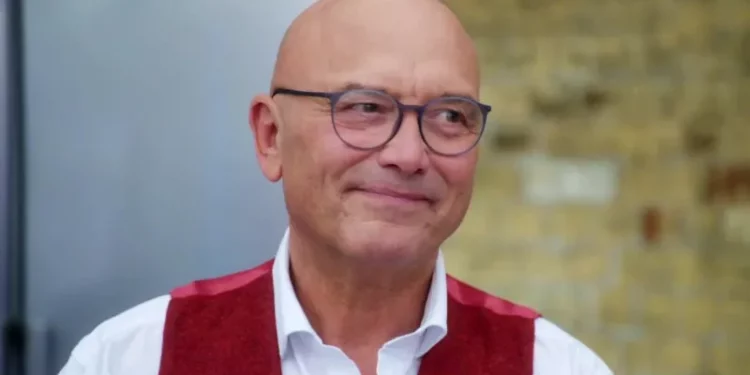The kind of inappropriate behaviour that MasterChef presenter Gregg Wallace has been accused of will be very familiar to many working in the British TV industry.
As researchers of working practices in the sector, we’ve encountered what can seem like an endless stream of stories of improper or abusive practices. Sadly, the underlying structures and cultures of the TV industry make such behaviour almost inevitable.
Wallace has been accused of inappropriately sexual behaviour, jokes and remarks during the making of his television shows by a number of women. His initial defence (for which he subsequently apologised) was that his accusers were “a handful of middle-class women of a certain age”.
His lawyers have also reportedly stated it is false that he engages in sexually harassing behaviour.
Several reports have drawn attention to working conditions within the UK television industry in recent months. In October the Guardian raised a litany of health and safety concerns across the sector.
Meanwhile actor Richard E. Grant used an interview on Sky News to draw attention to the treatment of television runners. He described a negative experience of his own daughter, who once worked as a runner, at the hands of “household names”.

Looking for something good? Cut through the noise with a carefully curated selection of the latest releases, live events and exhibitions, straight to your inbox every fortnight, on Fridays. Sign up here.
In November, an anonymous Guardian article by a seasoned television professional stressed the degree to which “inhumane” working conditions and are normalised across the industry.
The responses to these stories have included an account by a would-be TV production whistle-blower, whose attempts to report abuses were ignored, and a set of interviews with runners. They recounted their shocking, yet routine, experiences of bullying and harassment.
Endemic bullying and management challenges
Our research has identified a number of features that characterise the television industry, making it particularly vulnerable to abusive working practices.
The aspirational nature of television work means that people will tolerate abusive treatment and the precarious nature of the workforce means people are afraid to “rock the boat”.
The typically informal work culture can also mask inappropriate behaviour, while a culture of exceptionalism tolerates abusive practices by its star creative talent. Reluctant managers in the industry lack the training, skills or motivation to address issues as they arise.
These conditions put television workers at constant risk of bullying, harassment and poor mental health.
This article is part of our State of the Arts series. These articles tackle the challenges of the arts and heritage industry – and celebrate the wins, too.
In July, we interviewed series producers and production executives – people who in any other industry might be described as “middle managers”. We found that their working conditions, along with a lack of appropriate training, impeded their ability to exercise any meaningful duty of care toward staff or participants.
They described operating in a structural and cultural environment that produces seemingly insurmountable obstacles to good management practice.
Cultural challenges
The practical challenges these managers face are exemplified by the “unachievable goal” – the requirement to meet increasingly high expectations with increasingly diminished resources. It means goals can only be achieved through exploitative working practices.
Their cultural challenges, meanwhile, are exemplified by the creative exceptionalism which is used to excuse, even enable, behaviour and practices which would be deemed entirely unacceptable in any other industry.
As one of our participants put it:
There’s a sort of historic, cultural issue, which is [that] eccentric behaviour is tolerated to greater degree. There’s this assumption that if you’re a creative person you’re going to be versatile, you’re going to be eccentric, you know, you’re not going to abide by normal societal rules … I think it’s nonsense!
Moving away from ‘talent’
It is this culture of exceptionalism that BBC director general Tim Davie was targeting last month when he announced a ban on the term “talent” to describe presenters. He recognised it as a term that has been used to elevate individuals to an untouchable status.
The word is implicated in the extraordinary impunity with which Jimmy Savile was allowed to operate for years notwithstanding widespread awareness of his activities.
On December 2, former Celebrity MasterChef contestant Helen Lederer spoke about the Wallace allegations on the Today show on Radio 4. She argued that when producers choose to cast extrovert, edgy and unpredictable people in reality television shows, they need to manage the associated risks.
Unfortunately the way that production companies have typically handled such risks is by delegating them to the most vulnerable within their organisations: freelance staff who dare not rock the boat.
Put its house in order
These lesser mortals have been expected to accommodate the vagaries of the “talent”, acting as human shock absorbers for the good of the production. Such practices are simply no longer acceptable. Additionally, companies now risk falling foul of new sexual harassment legislation if they fail to protect all their employees, whatever their status.
The creative and cultural industries have been identified as a key sector within the new government’s industrial strategy. Yet the apparent permacrisis in terms of poor working conditions, mental health and management practices across the UK’s creative industries does not bode well for their sustainability and growth.
The television industry needs to put its house in order if it is be fit for the challenges ahead.![]()
Christa van Raalte, Associate Professor of Film and Television, Bournemouth University and Richard Wallis, Principal Academic in Media Production, Faculty of Media & Communication, Bournemouth University
This article is republished from The Conversation under a Creative Commons license. Read the original article.














